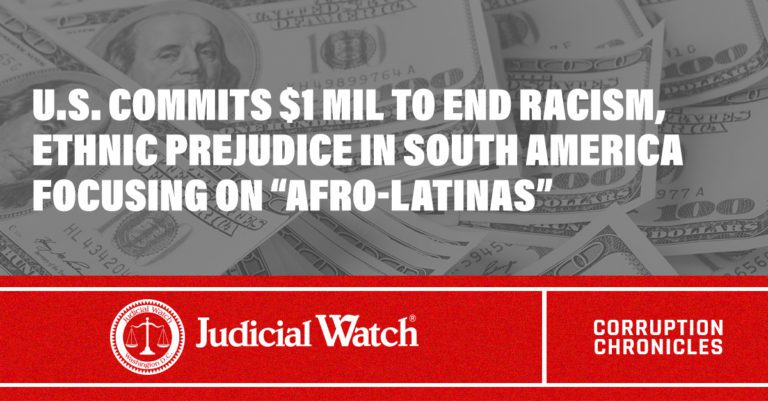
U.S. Commits $1 Mil to End Racism, Ethnic Prejudice in South America Focusing on “Afro-Latinas”

As part of its foreign policy on “advancing racial equity and support of underserved communities,” the Biden administration is spending a million dollars to eliminate racial and ethnic discrimination, inequality, and systemic racism in South America. Besides bolstering racial justice in the foreign nations, the U.S. taxpayer dollars will encourage civil society organizations to promote and protect the human rights of communities marginalized by “intersectional discrimination,” according to the grant announcement posted by the government this month. The administration identifies intersectional discrimination as “multiple and overlapping social identities, including communities experiencing disproportionate injustices such as Afro-Latinas and African Descendant members of LGBTI+ communities.”
The administration is intervening because it says that “around the world, people of color, and in particular people of African descent, are disproportionately discriminated against, forced to endure high levels of violence and excruciating labor conditions, and are systematically denied access to justice and full economic, political, cultural, and social participation in society.” The money, which will flow through the State Department’s Bureau of Democracy Human Rights and Labor (DRL), will help empower underrepresented and underserved racial and ethnic communities and uphold the dignity of people who are systemically denied their human rights and fundamental freedoms. “DRL endeavors to acknowledge the legacy and suffering of millions of people as a result of slavery and other deliberate malevolent events in history,” the grant announcement states.
The project aims to mitigate bias, discrimination and violence from institutions designed to protect and serve society, including underserved and underrepresented racial and ethnic communities; ensure the fair administration of justice for underrepresented and underserved racial and ethnic communities and counter societal discrimination and violence by advancing equity, social inclusion, and equality for all. The goal is to increase leadership of individuals from underserved racial and ethnic communities with a “specific focus on Afro-Latinas and African Descendant members of LGBTQI+ communities.” Other goals include increased access to secure and culturally competent legal services to address systemic racism, the development of inclusive legislation and policies, and increased awareness of human rights abuses and the costs of systemic racism.
Before receiving funds grant recipients must conduct a “gender and inclusion analysis” that provides relevant gender norms, power relations, and conflict dynamics in target countries, according to the grant Proposal Submission Instructions. “Potential domains of analysis include institutional practices and barriers, cultural norms, gender roles, equity and equality for underserved communities and marginalized populations, access to and control over assets and resources, and patterns of decision-making,” the document states. Applicants must also address barriers for equal participation by explaining how information about religious minorities, women, LGBTI persons, persons with disabilities, racial and ethnic minorities, and indigenous communities will be collected and included in the proposed program. “The degree to which collecting sensitive demographic data may discourage or present a barrier to beneficiaries participating in activities, however, must be considered prior to collection of such data,” the proposal submission instructions read.
The million-dollar award is part of a Biden executive order issued in January to advance racial equity and support for underserved communities through the federal government, though the order focuses on tackling the issue in the U.S. not abroad. The president’s document claims that “entrenched disparities” in laws, public policies, and private institutions have denied equal opportunity to individuals and communities and that the health and climate crises have exposed inequities while a “historic movement for justice has highlighted the unbearable human costs of systemic racism.” Therefore, the order states, the federal government should pursue a “comprehensive approach to advancing equity for all, including people of color and others who have been historically underserved, marginalized, and adversely affected by persistent poverty and inequality.”
















